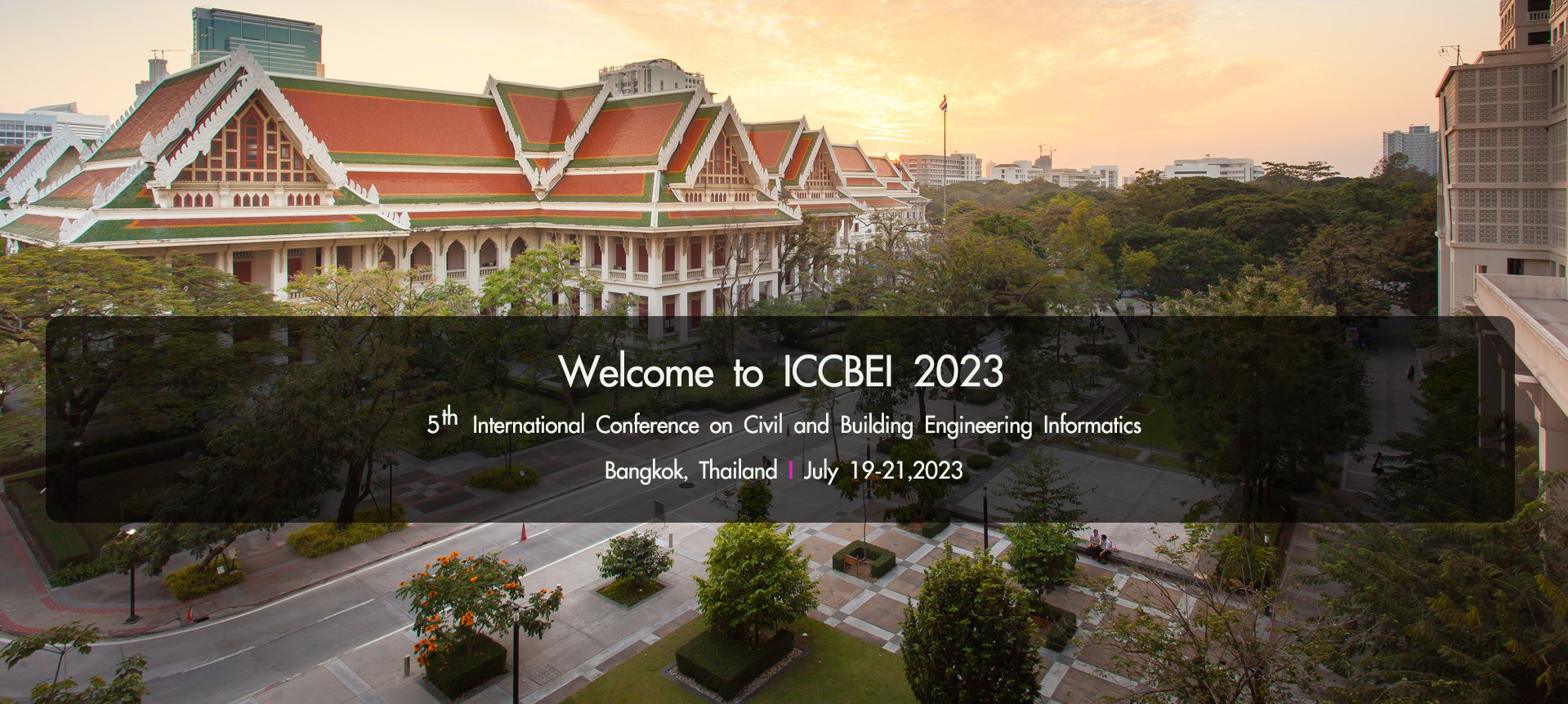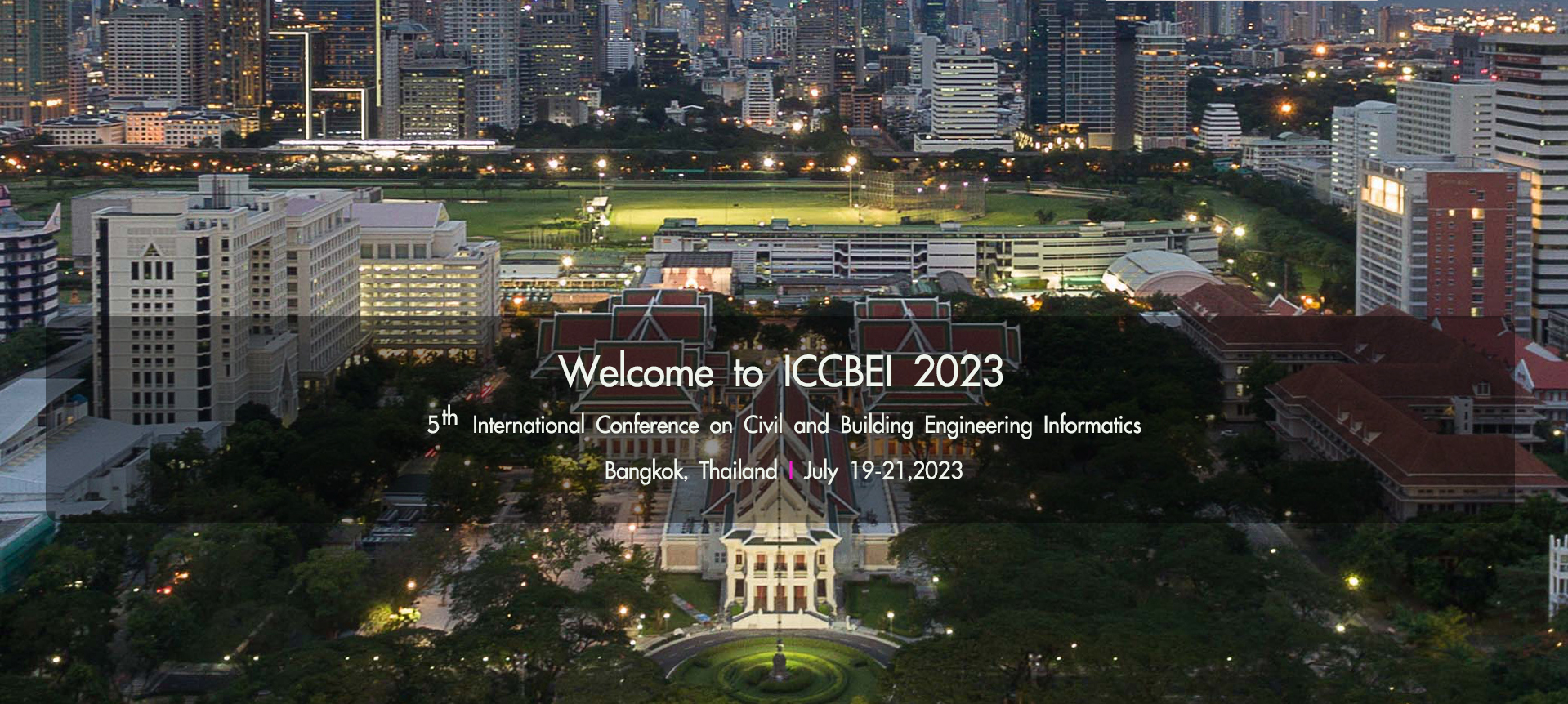The Fifth International Conference on Civil and Building Engineering Informatics (ICCBEI 2023) covers a wide range of research fields in the application of Information and Communication Technology (ICT) to Civil, Building, and Environmental Engineering. The topics include but not limited to Building and Construction Information Modeling (BIM/CIM); Digital Twin; Information and Process Management; Laser and Image Scanning; IoT Sensors and Monitoring; Visualization and XR (VR/AR/MR); Smart Cities; Facility, Infrastructure, and Asset Management; Computational Mechanics and Engineering; Construction Engineering and Management; Disaster Management; Green Construction and Sustainability; Water Resources and Environmental Engineering; Architecture, Engineering, Construction and Operation (AECO) Industrial Issues and more.
Important Dates
February 28 : Abstracts due (optional but recommended)
March 10 : Notification of abstract acceptance
April 10 : Full papers due
April 30 : Notification of paper review results
May 15 : Final draft submission
May 31 : Notification of full-paper acceptance
June 1 : Online registration start
June 15 : Online registration deadline
July 19 : Conference Excursion & Reception
July 19-21 : Conference (Bangkok, Thailand)
Keynote Speakers
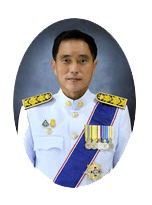
Wisanu Subsompon
Deputy Governor Bangkok Metropolitan Administration

Xiangyu Wang
Professor Curtin University, Australia

Photios G. Ioannou
Professor University of Michigan (Ann Arbor), USA
Associate Professor Wisanu Subsompon,Ph.D., Deputy Governor Bangkok Metropolitan Administration
Transforming Urban Living in Bangkok: The Role of Infrastructure Asset Management in Creating a Smart City
The rapid urbanization and population growth in cities worldwide have presented numerous challenges, and Bangkok is no exception. In response to these challenges, the Bangkok Metropolitan Administration (BMA) has embarked on a transformative journey to establish a smart and sustainable metropolis. A crucial component of this transformation is Infrastructure Asset Management (IAM), which harnesses technology to enhance the efficiency, resilience, and quality of urban infrastructure. Two key areas of focus in this endeavor are Pavement Analysis for Maintenance and Lighting Control Systems. By integrating advanced technologies such as the Internet of Things (IoT), survey technology, artificial intelligence, and data analytics, the BMA effectively monitors, maintains, and optimizes the city’s infrastructure assets.
The application of Pavement Analysis for Maintenance ensures that Bangkok’s roads and sidewalks are in optimal condition. By utilizing survey technology, and data analytics, the BMA can proactively identify areas requiring maintenance, minimizing disruptions and enhancing overall transportation efficiency. This approach results in cost savings and improved safety for residents and commuters.
The implementation of a sophisticated Lighting Control System is another significant aspect of Bangkok’s smart city transformation. Through IAM, the BMA leverages advanced technologies to monitor and control street lighting. This enables efficient energy management, reduced light pollution, and enhanced safety in public spaces. By leveraging data analytics, the BMA can identify patterns and optimize lighting schedules, creating a more sustainable and citizen-centric urban environment.
While Bangkok has made substantial progress in its smart city journey, several challenges remain. These include concerns related to privacy and security, the need for infrastructure upgrades, and ensuring equitable access to technology for all citizens. To address these challenges, Bangkok should continue to foster collaboration between the public and private sectors, invest in research and development, and place a strong emphasis on citizen engagement and inclusivity.
Professor Xiangyu Wang, Curtin University, Australia
Engineering Brain: Metaverse for the future engineering
Engineering Brain is a sophisticated system that uses AI algorithms to analyse data and provide valuable insights to engineers. It allows engineers to simulate various construction scenarios and predict their outcomes, enabling them to make informed decisions in real-time. By integrating BIM, engineers can create a digital twin of the project that captures every detail of the physical structure, from the design to the construction phase. This technology enhances collaboration between all parties involved, including architects, engineers, contractors, and owners. This keynote presentation will provide attendees with an in-depth understanding of the engineering brain concept and its application in construction and civil engineering. The presentation will begin by introducing the basic principles of the engineering brain and its components. Then, the presentation will delve into the benefits of using the engineering brain in construction and civil engineering, including improved accuracy, efficiency, and sustainability. The keynote presentation will also discuss various case studies and real-world examples of successful engineering brain implementations. Attendees will have the opportunity to learn about the challenges faced during implementation and the solutions that were employed to overcome them. Finally, the keynote presentation will conclude with a discussion of the future of the engineering brain in construction and civil engineering.
Professor Photios G. Ioannou, University of Michigan, USA
Decision Support Systems for Civil Engineering Construction
Decision support systems have been developed and applied at all levels of civil engineering construction. This presentation will concentrate on two such applications. At the strategic level we will examine how competitive bidding models can help a contractor select the optimum price for a lump-sum construction contract. We will also examine the importance of cost uncertainty and the contractor’s risk aversion on the optimum bid price. These are two factors that have traditionally been ignored even though they have a significant impact on how much the contractor should bid. At the operational level we will describe the discrete event simulation systems that have been developed at the University of Michigan, such as UM-CYCLONE, COOPS, STROBOSCOPE, and EZSTROBE, for modeling construction processes under uncertainty. The most modern of these, STROBOSCOPE and EZSTROBE, are used throughout the world for research, teaching, and practice, and are available from www.stroboscope.org. Applications of these systems to be presented include general earthmoving, dam construction, tunneling, and the scheduling of projects with repeating activities under uncertainty.
Call for Paper
Registration Fee*
- Full registration20,000 THB
- Student registration10,000 THB
- Local registration*8,000 THB
*Registration fee does not include transaction fee(s).
**Local registration not including reception & banquet.
Full-Paper Submission
Please submit the Word (.docx) and PDF versions of your full paper into the EasyChair system.
Link to submission system: easychair.org/conferences/?conf=iccbei2023
How to make a new submission: easychair.org/help/how_to_submit
Abstract Template
Abstract template for the 5th International Conference on Civil and Building Engineering Informatics. Bangkok, Thailand.
Full-paper Template
Full-paper template for the 5th International Conference on Civil and Building Engineering Informatics. Bangkok, Thailand.
Guidelines for ICCBEI 2023 Presentation
1. A presenter is required to show up and submit his/her presentation file to the session coordinator at least 10 minutes before his/her session begins.
2. Each presenter will have 12 minutes for his/her presentation and 3 minutes for Q&A.
3. All presenters who are undergraduate or graduate students are qualified for a Best Presentation Award, which will be announced during the closing ceremony (July 21, from 17:15).
Best Paper Awards and Best Persentation Award
In this conference, five (5) papers will be honored for the Best Paper Awards and one (1) paper presenter (student) will be honored for the Best Presentation Award.
ICCBEI 2023 Best Paper
(1)
AN AUTOMATIC TRANSLATION FRAMEWORK BASED ON ONTOLOGY TO BUILDING ENERGY MODELS
Zhaoji Wu, Jack C.P. Cheng, Zhe Wang, and Helen H.L. Kwok
(2)
A BLOCKCHAIN-BASED CARBON AUDITING FRAMEWORK FOR CONSTRUCTION MATERIAL AND PRODUCT CERTIFICATION
Yuqing Xu, Xingyu Tao, Moumita Das, Helen H.L. Kwok, Hao Liu, and Jack C.P. Cheng
(3)
BUILDING INFORMATION MODEL FOR SENSING AND SIMULATION TOWARD NET-ZERO ENERGY BUILDING RENOVATION
Kazuya Matsuba, Nobuyoshi Yabuki, Tomohiro Fukuda, and Yoshiro Hada
(4)
A PROPERTY DATA SHARING METHOD OF BUILDING INFORMATION MODELS USING REMOTE AUGMENTED REALITY
Koji Yoshimura, Nobuyoshi Yabuki, and Tomohiro Fukuda
(5)
AUTOMATED DIMENSIONAL CHECKING IN MIXED REALITY FOR STAIRCASE FLIGHT
Michelle Siu Zhi Lee, Nobuyoshi Yabuki, and Tomohiro Fukuda
ICCBEI 2023 Best Presentation
Zhiyuan Liu
INTELLIGENT DESIGN OF SIMPLY-SUPPORTED PLANAR TRUSS
BASED ON REINFORCEMENT LEARNING
Venue
The conference will be held at Samyan Mitrtown Hall, the fifth floor of Samyan Mitrtown complex at the corner of Phayathai and Rama 4 Roads, next to Chulalongkorn University Campus in Bangkok. (see map).
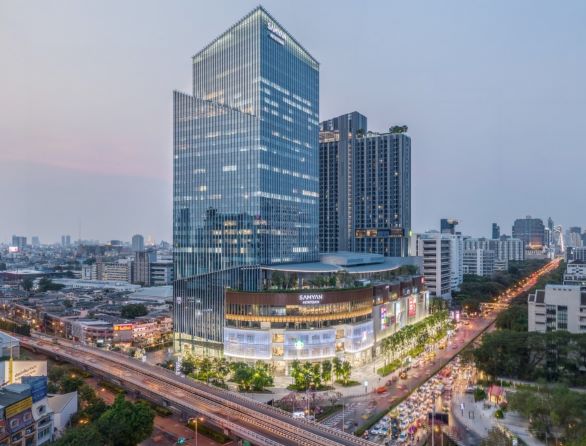
Samyan Mitrtown
A quintessential welcome for your academic symposium
Samyan Mitrtown Hall is located in the intellectual hub of Bangkok, on the top floor of Samyan Mitrtown.
Fly to Bangkok
Visa Information
Please refer to the MFA’s website: Guide to Thailand Visa application
Transport
Train from Suvarnabhumi International Airport:
The accessible Airport Rail Link (ARL) is situated in the lower level of the airport, which connects directly to Bangkok downtown. Take the ARL City Line and transfer to MRT Blue Line then get off at Sam Yan Station.
Train from Don Mueang International Airport:
The SRT Dark Red Line is situated acrossed the airport. Take the SRT Dark Red Line and transfer to MRT Blue Line then get off at Sam Yan Station.
Taxi from airports
Taxi stand is situated on the first floor of the airport. It’s a relatively inexpensive option costing around $10-15 depending on the traffic.


Access to samyan mitrtown
For the detailed directions with Google Maps, [ Click Here ]


Special Rates of Hotels for ICCBEI 2023
About ICCBEI 2023

Associate Professor Veerasak Likhitruangsilp,Ph.D.
Chair of ICCBEI 2023 Chulalongkorn University (Thailand)
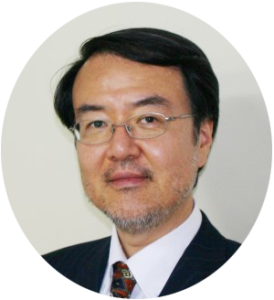
Professor Nobuyoshi Yabuki
President of Board of Director, AGCEI Osaka University (Japan)
Asian Group for Civil Engineering Informatics (AGCEI)
About Asian Group for Civil Engineering Informatics (AGCEI) was developmentally organized from the previous series of Asian Construction Information Technology Roundtable Meeting sponsored by the Japan Society of Civil Engineers (JSCE) and Japan Construction Information Center (JACIC). AGCEI is a sister organization of International Society for Computing in Civil and Building Engineering (ISCCBE), and ICCBEI, which is organized by AGCEI, is a sister international conference of International Conference on Computing in Civil and Building Engineering (ICCCBE) officially. ICCBEI is to be held in the odd number years in Asia, while International Conference on Computing in Civil and Building Engineering (ICCCBE), which is organized by ISCCBE, is to be held in the even number years. Although ICCBEI is held in Asia, it is a truly international conference, and we welcome participants from all over the world.
Organizing Committee
Advisors
- Supot Teachavorasinskun, Dean of Engineering, Chulalongkorn U.
- Boonchai Stitmannaithum, Head of Civil Engineering Department, Chulalongkorn U.
Chair
- Veerasak Likhitruangsilp, Dept. of Civil Engineering, Chulalongkorn U.
Vice Chair
- Tirawat Boonyatee, Dept. of Civil Engineering, Chulalongkorn U.
Members
- Nakhon Kokkaew, Dept. of Civil Engineering, Chulalongkorn U.
- Tidarut Wisuthseriwong, Dept. of Civil Engineering, Chulalongkorn U.
- Veerayut Komolvilas, Dept. of Civil Engineering, Chulalongkorn U.
- Chayut Ngamkhanong, Dept. of Civil Engineering, Chulalongkorn U.
- Sanphet Chunithipaisan, Dept. of Survey Engineering, Chulalongkorn U.
- Aksara Puttividhya, Dept. of Water Resources Engineering, Chulalongkorn U.
- Kaweekrai Srihiran, Dept. of Architecture, Chulalongkorn U.
- Sutee Anantsuksomsri, Dept. of Urban and Regional Planning, Chulalongkorn U.
- Terdsak Tachakitkachorn, Dept. of Architecture, Chulalongkorn U.
- Chavanont Khosakitchalert, Dept. of Architecture, Chulalongkorn U.
- Manop Kaewmoracharoen, Dept. of Civil Engineering, Chulalongkorn U.
- Charinee Limsawasd, Dept. of Civil Engineering, Chulalongkorn U.
Scientific Committee
Chair
- Nobuyoshi Yabuki (Osaka University, Japan)
Vice Chair
- Veerasak Likhitruangsilp (Chulalongkorn University, Thailand)
Members
- Jack Chin Pang Cheng (Hong Kong University of Science and Technology, Hong Kong)
- Patrick Shang-Hsien Hsieh (National Taiwan University, Taiwan)
- Sang-Ho Lee (Yonsei University, Korea)
- Zhiliang Ma (Tsinghua University, China)
- Koji Makanae (Miyagi University, Japan)
- Weng Tat Chan (National University of Singapore, Singapore)
- Xiangyu Wang (Curtin University, Australia)
- Sutee Anantsuksomsri (Chulalongkorn University, Thailand)
- Nilobol Aranyabhaga (Office of National Water Resources, Thailand)
- Farrukh Arif (NED University of Engineering and Technology Karachi, Pakistan)
- Nathee Athigakunagorn (Kasetsart University, Thailand)
- Nida Azhar (NED University of Engineering and Technology Karachi, Pakistan)
- Vacharapoom Benjaoran (Suranaree University of Technology, Thailand)
- Tirawat Boonyatee (Chulalongkorn University, Thailand)
- Apichat Buakla (University of Phayao, Thailand)
- Krisada Chaiyasarn (Thammasat University, Thailand)
- Saksith Chalermpong (Chulalongkorn University, Thailand)
- Thongthit Chayakula (Chulalongkorn University, Thailand)
- Albert Y Chen (National Taiwan University, Taiwan)
- Sanphet Chunithipaisan (Chulalongkorn University, Thailand)
- Hiroaki Date (Hokkaido University, Japan)
- Sy Tien Do (Ho Chi Minh City University of Technology (HCMUT), Vietnam)
- Tomohiro Fukuda (Osaka University, Japan)
- Vincent J.L. Gan (National University of Singapore, Singapore)
- Brian Guo (University of Canterbury, New Zealand)
- Tantri Handayani (Universitas Gadjah Mada, Indonesia)
- Abdulrahman Haruna (Abubakar Tafawa Balewa University, Nigeria)
- Wen-Yi Hung (National Central University, Taiwan)
- Manop Kaewmoracharoen (Chulalongkorn University, Thailand)
- Satoshi Kanai (Hokkaido University, Japan)
- Chavanont Khosakitchalert (Chulalongkorn University, Thailand)
- Hongjo Kim (Yonsei University, South Korea)
- Namgyun Kim (University of Dayton, USA)
- Tuantan Kitpaisalsakul (Chulalongkorn University, Thailand)
- Karun Klaycham (Kasetsart University, Thailand)
- Nakhon Kokkaew (Chulalongkorn University, Thailand)
- Veerayut Komolvilas (Chulalongkorn University, Thailand)
- Nipawan Kunsuwan (Kasetsart University, Thailand)
- Chollada Laofor (Mahanakorn University of Technology, Thailand)
- Panon Latcharote (Mahidol University, Thailand)
- Hang Thi Thu Le (University of Architecture Ho Chi Minh City, Vietnam)
- Sang-Ho Lee (Yonsei University, Korea)
- Sutat Leelataviwat (King Mongkut’s University of Technology Thonburi, Thailand)
- Narong Leungbootnak (Future Engineering Consultants Co., Ltd, Thailand)
- Ting Li (Shijiazhuang Tiedao University, China)
- Charinee Limsawasd (Chulalongkorn University, Thailand)
- Petcharat Limsupreeyarat (Burapha University, Thailand)
- Ping Liu (Jiangsu University of Science & Technology, China)
- Masaya Nakahara (Osaka Electro-Communication University, Japan)
- Kenji Nakamura (Osaka University of Economics, Japan)
- Sorawit Narupiti (Chulalongkorn University, Thailand)
- Chayut Ngamkhanong (Chulalongkorn University, Thailand)
- Vachara Peansupap (Chulalongkorn University, Thailand)
- Patraphorn Phornthepkasemsant (Burapha University, Thailand)
- Sarin Pinich (Chulalongkorn University, Thailand)
- Lapyote Prasittisopin (Chulalongkorn University, Thailand)
- Aksara Putthividhya (Chulalongkorn University, Thailand)
- Pher Errol B. Quinay (University of the Philippines Diliman)
- Damrongsak Rinchumphu (Chiang Mai University, Thailand)
- Jittichai Rudjanakanoknad (Chulalongkorn University, Thailand)
- IMAI, Ryuichi (Hosei University, Japan)
- Natthapol Saovana (King Mongkut’s University of Technology North Bangkok, Thailand)
- Kaweekrai Srihiran (Chulalongkorn University, Thailand)
- Natee Suriyanon (Chiang Mai University, Thailand)
- Terdsak Tachakitkachorn (Chulalongkorn University, Thailand)
- Wisuwat Taesombat (Kasetsart University, Thailand)
- Takahiro Tanaka (Hiroshima University, Japan)
- Wasaporn Techapeeraparnich (Mahidol University, Thailand)
- Kongkoon Tochaiwat (Thammasat University, Thailand)
- Tuan Van Tran (Can Tho University, Vietnam)
- Kanok Weerawong (Chulalongkorn University, Thailand)
- Tidarut Wisuthseriwong (Chulalongkorn University, Thailand)
- I-Tung Yang (National Taiwan University of Science and Technology, Taiwan)
- Xianzhong Zhao (Tongji University, China)
- Jin Zhu (University of Connecticut, USA)
- Yang Zou (University of Auckland, New Zealand)

The conference is hosted by Chulalongkorn University and is organized by Asian Group for Civil Engineering Informatics (AGCEI).
Contact Us
For all inquiries, please contact Assoc.Prof. Veerasak Likhitruangsilp
Email: Veerasak.L@chula.ac.th
Department of Civil Engineering, Faculty of Engineering
Chulalongkorn University, Bangkok, Thailand.
